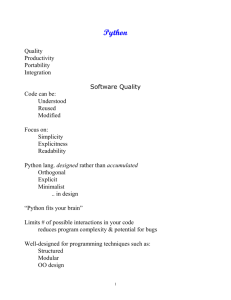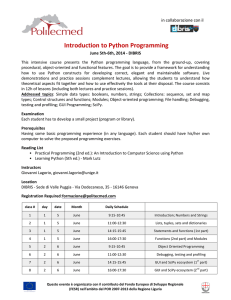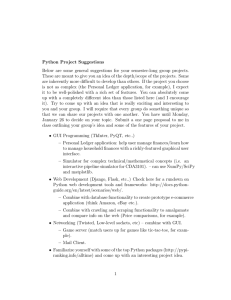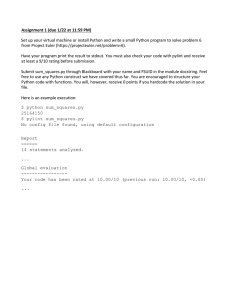Philadelphia University Faculty of Information Technology Department of Software Engineering
advertisement
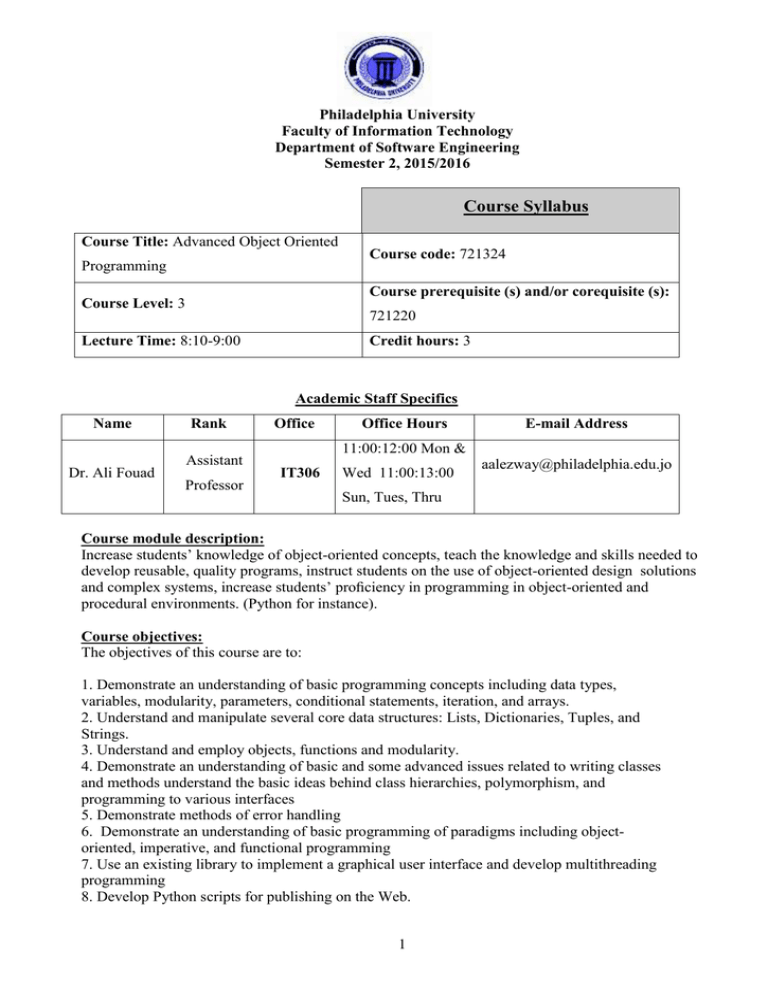
Philadelphia University Faculty of Information Technology Department of Software Engineering Semester 2, 2015/2016 Course Syllabus Course Title: Advanced Object Oriented Programming Course code: 721324 Course prerequisite (s) and/or corequisite (s): Course Level: 3 721220 Lecture Time: 8:10-9:00 Credit hours: 3 Academic Staff Specifics Name Dr. Ali Fouad Rank Assistant Professor Office Office Hours E-mail Address 11:00:12:00 Mon & IT306 Wed 11:00:13:00 aalezway@philadelphia.edu.jo Sun, Tues, Thru Course module description: Increase students’ knowledge of object-oriented concepts, teach the knowledge and skills needed to develop reusable, quality programs, instruct students on the use of object-oriented design solutions and complex systems, increase students’ proficiency in programming in object-oriented and procedural environments. (Python for instance). Course objectives: The objectives of this course are to: 1. Demonstrate an understanding of basic programming concepts including data types, variables, modularity, parameters, conditional statements, iteration, and arrays. 2. Understand and manipulate several core data structures: Lists, Dictionaries, Tuples, and Strings. 3. Understand and employ objects, functions and modularity. 4. Demonstrate an understanding of basic and some advanced issues related to writing classes and methods understand the basic ideas behind class hierarchies, polymorphism, and programming to various interfaces 5. Demonstrate methods of error handling 6. Demonstrate an understanding of basic programming of paradigms including objectoriented, imperative, and functional programming 7. Use an existing library to implement a graphical user interface and develop multithreading programming 8. Develop Python scripts for publishing on the Web. 1 Course/ module components Books (title , author (s), publisher, year of publication) Guttag, John V. (Author) New Delhi: PHI Learning Private Limited, 2014 ISBN : 978-81-203-4866-0 Introduction to computation and programming using python Support material (s) (vcs, acs, etc). Homework and laboratory guide. Teaching methods: Lectures, discussion groups, tutorials, problem solving, debates, etc. Duration: 15 weeks, 45 hours in total Lectures: 30 hours, 2 per week Laboratories: 15 hours, 1 per week Learning outcomes: At the end of the course students should be able to: Knowledge and understanding 1. Identify object-oriented design concepts, teach the knowledge and skills (A2) 2. Recognize and use several core data structures: Lists, Dictionaries, Tuples, and Strings. (A2) 3. Extends students’ proficiency in programming in object-oriented and procedural environment (A2) 4. Recognize basic programming paradigms including object-oriented, imperative, and functional programming (A2) Cognitive skills (thinking and analysis). 5. Acquire a full Object Oriented Thinking (B4) 6. Be able to design small object oriented programs which meet requirements expressed in English. (B3) 7. Be able to develop programs in python programming language. (B4) Practical skills - able to 8. Use object-oriented programming techniques to design and implement a clear, well-structured Python program (C1) 9. Apply Python Exception Handling model to develop robust programs and learn how to use it. (C5) 10. Write and debug Python programs which make use of the fundamental control (C5) 11. Use API libraries for python (C4) 12. Recognize basic programming paradigms including object-oriented, imperative, and functional programming (C3) Transferable skills - able to 13. Solve problems that have origins in a variety of paradigms including objectoriented, imperative, and functional programming. (D2) 14. Work as part of a team (D6) 15. Be able to demonstrate communication skills (personal and academic). (D4) 16. Transfer practical and subject specific skills (Transferable Skills). (D2) Assessment instruments 2 Learning outcomes (1-7) are assessed by examinations; Learning outcomes (8, 9, 10, 11, 12, 13, and 16) are assessed by examinations, tutorials, projects/assignments, by laboratory works; Learning outcomes (14, 15) are assessed by projects. Allocation of Marks Assessment Instruments Mark First examination 20 Second examination 20 Final examination: 40 marks 40 Reports, research projects, Quizzes, Home works, Projects Total 20 100 Assignments All assignments will be announced or handed out in class. Many assignments will require programming in Python. All individual assignments, whether programming or not, are to be done individually. While you may discuss the assignment in general terms with others, your solutions should be composed, designed, written and tested by you alone. If you need help, consult the TA or the instructor. Documentation and academic honesty Documentation style (with illustrative examples) Protection by copyright Avoiding plagiarism. Course/module academic calendar week (1) (2) (3) (4) (5) (6) First examination (7) (8) (9) (10) (11) Second examination (12) (13) (14) Basic and support material to be covered Homework/rep orts and their due dates Cornerstones of Computing Getting Started in Python Elementary Control Structures Additional Control Structures Defining Our Own Classes Assignment 1 Assignment 2 Assignment 3 Good Software Practices Assignment 4 Input, Output, and Files Inheritance Deeper Understanding of the Management of Objects Assignment 5 Assignment 6 More Python Containers (Dictionaries,…) Assignment 8 Implementing Data Structures Assignment 9 Event-Driven Programming and API Scripts for publishing on the Web Functional programming Assignment 10 Assignment 11 Assignment 12 3 Assignment 7 Status (15) Specimen examination (Optional) (16) Final Examination A case study/Project Expected workload: On average students need to spend 2 hours of study and preparation for each 50-minute lecture/tutorial. Attendance policy: Absence from lectures and/or tutorials shall not exceed 15%. Students who exceed the 15% limit without a medical or emergency excuse acceptable to and approved by the Dean of the relevant college/faculty shall not be allowed to take the final examination and shall receive a mark of zero for the course. If the excuse is approved by the Dean, the student shall be considered to have withdrawn from the course. Module references Books Students will be expected to give the same attention to these references as given to the Module textbook(s) 1. Mark Lutz and David Ascher, "Learning Python", Beijing: O'Reilly, 2004, 2nd ed.. 2. Deitel, H. M, " Python : how to program ", Upper Saddle River, New Jersey: Prentice Hall, 2002 3. Dusty Phillip , "Python 3 Object Oriented Programming", Packt, July 2010. (ISBN : 1849511268 ISBN 13 : 978-1-849511-26-1) 4. Allen B. Downey, " Python for Software Design How to Think Like a Computer Scientist", Olin College of Engineering, Massachusetts, May 2009. (ISBN-13: 9780521898119) 5. Michael H Goldwasser,Saint Louis University , David Letscher, Saint Louis University , “Object-Oriented Programming in Python “, ISBN-10: 013615031, Publisher: Prentice Hall Copyright: 2008 Websites www.python.org http://www.learningpython.com/ 4
